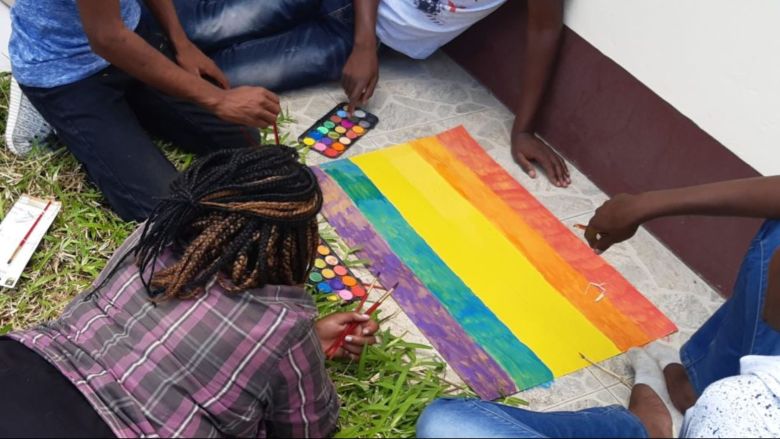Pride in Isolation
by Chack Jacob, kanthari catalyst
“Would it bother you if your roommate is from a completely different culture or belief system?”
“Absolutely not, I love working with different kinds of people”
“We also have participants from the LGBTQI community, who face a lot of discrimination in many African countries, what’s your opinion on that?”
“Aah… the LBG… LTB…LG…. those people… in our country that’s not allowed. But we are all human beings. As long as we give each other space and they don’t impose their beliefs on me, It’s fine.”
This is a common response from African applicants during interviews for the selection of our participants each year. Some responses are ridiculous and shocking, while others give us hope for the situation of LGBTQI rights in Africa.
Documentaries like God Loves Uganda give us an insight into how religious fundamentalism created an atmosphere of extreme homophobia and transphobia in African nations. The hatred of the LGBTQI community is, of course, not restricted to the African continent. The news that pours in everyday of killings in Honduras, government backed persecution in Iraq, open attacks and draconian laws against gay people in Russia show the openly hostile environment LGBTQI people face all around the world.
Zimbabwe is surrounded by Mozambique, Botswana, South Africa, and Zambia. The first three neighbouring countries have passed landmark rulings in recent history favoring LGBTQI protections. But for Zimbabwe, years of vitriolic hatred from the Mugabe government have left LGBTQI rights in tatters.
So how are our gay, lesbian, bisexual, transgender, queer, intersex and other kin in Zimbabwe holding up during Corona times?
“Corona affects the LGBTQI community in many ways, one is due to the fact that we all have to stay at home and many have not (yet) come out to their parents or siblings”, says Trevor Molife, 2018 kanthari and founder of Purple Hand Africa (PHA). He continues, “and those who take hormones to proceed with gender transformation have difficulties to get their medicine.”
Also, those who are forced to stay at home have to come out involuntarily, either from not being able to hide it any longer or due to exposure of the visible evidence of their sexuality. This for many is a rather dangerous situation. For them and the ones who have already come out but are not accepted by their families, there are instances of verbal and even physical abuse. With police brutality towards gender nonconforming individuals (especially when there is a mismatch between the gender on their ID cards and what they identify with), livelihood loss due to constant discrimination in the job market, and food insecurity, the situation is quite grim.
PHA, in partnership with other organizations such as GALZ, has been able to consolidate a list of persons in need and has provided them with food hampers and masks, thereby mitigating some aspects of this dire situation.
Trevor explains that NGOs who deal with the topic of LGBTQI have HIV as their central focus. He wants to go beyond discussing HIV and AIDS and focus on dignity, livelihood, leading a good and healthy life, and not being afraid. To Trevor, the first steps should be about mental health because, “as long as you are not mentally well you cannot talk about livelihood.”
Having identified that mental wellness is a huge gap in the services currently provided to LGBTQI people in Zimbabwe, Purple Hand Africa was able to organize mental wellness camps (before the lockdown) in four different parts of the country. Through exercises such as body mapping, participants were able to delve deep into their identity; how society sees them vs. how they see themselves. This exercise was met with excitement (Yes, coloring! That is my favorite!) and, at the other end of the scale, confusion (Wait… what do you want to me to do exactly??). Slowly and steadily, the participants began to peel back layers of identity: what had been imposed on them, what they imposed on themselves, who they truly wanted to be, and where they actually are on the journey to acceptance. PHA is working on a documentary that captures the individual journeys set off by these workshops. It is set to be released at the end of this month.
After the lockdown, PHA will continue conducting community workshops that focus first on mental wellness and then on livelihood. The community will come together along with allies and members of the rest of society to write stories about their lives. This collection of stories will then be published in the hope that it will change the current narratives. These personal stories would serve to humanize what much of the country has demonized for so long and create a stronger movement towards freeing the rights and establishing protection of the LGBTQI community.
“….As [a] community we always see a light at the end of the tunnel and a rainbow in the distance after the rain.” – Trevor Molife
Footnote: The name Purple Hand Africa comes from the LGBT symbol “Purple Hand”. In 1969 a group of gay rights activists protested outside the office of the San Francisco Examiner in response to an article disparaging the gay community. The Examiner employees poured a barrel of purple ink from the roof onto the protestors. The protestors proceeded to scrawl slogans on the building walls and make purple handprints all over downtown San Francisco. At this point the police arrived and brutalized them. This day of a very visible display of gay rights and the violence thereafter was termed “Friday of the Purple Hand”.

